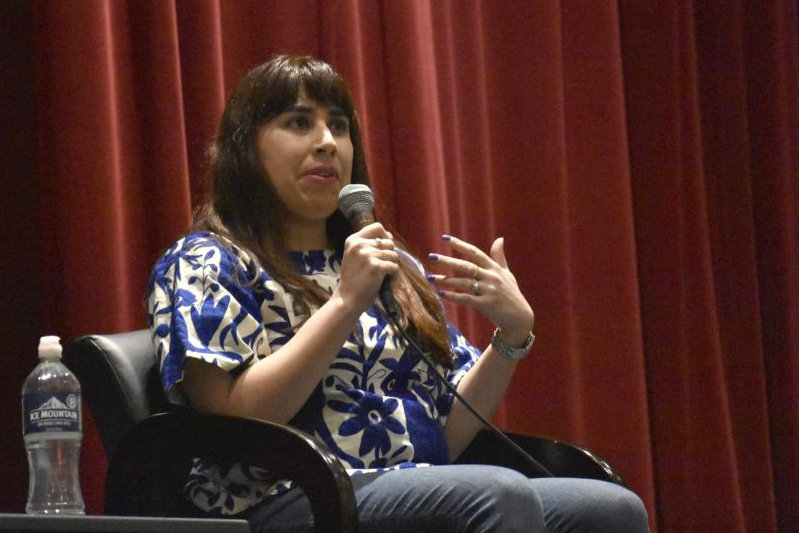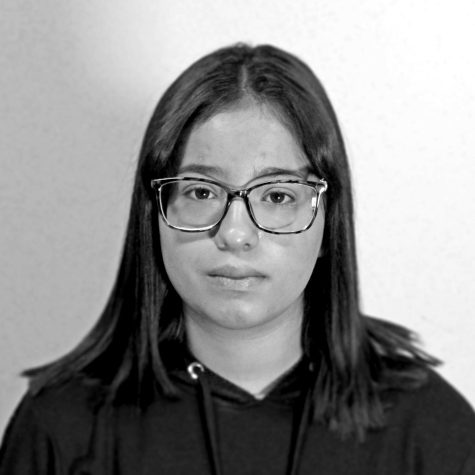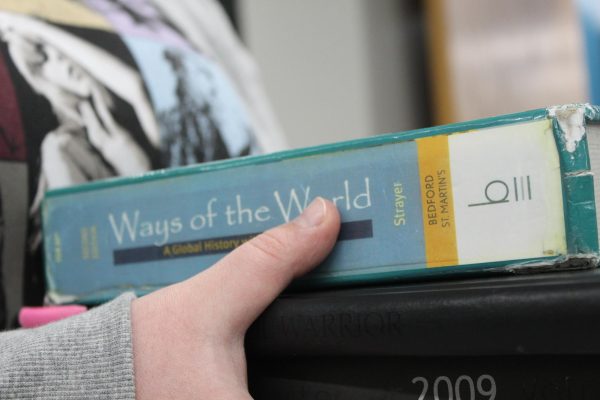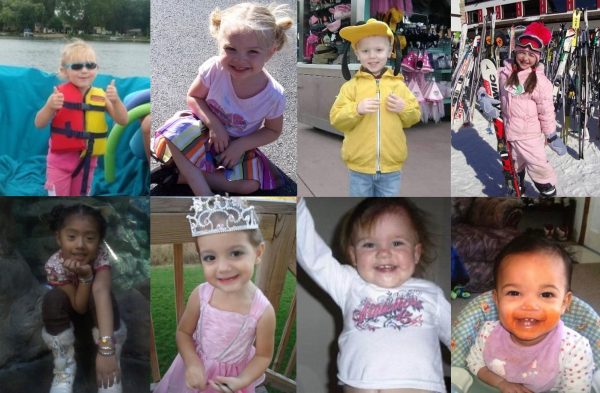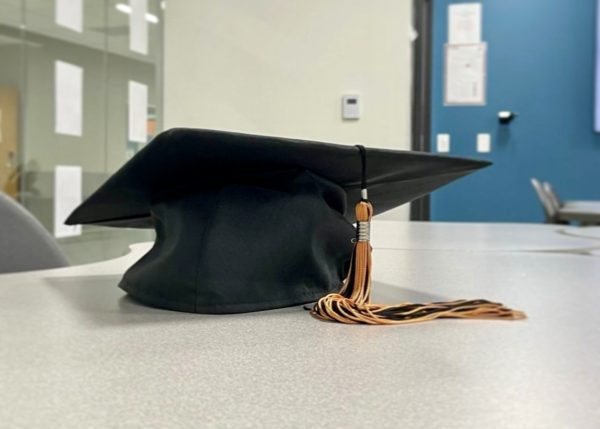She’s not your perfect Mexican daughter
Author Erika Sánchez reflects on her writing, life, being a woman of color and what’s next for her
Erika Sanchez speaks about her writing on Feb. 8 in the Upper Campus auditorium as part of Writer’s Week.
February 27, 2023
Growing up in a traditional Mexican household, author-poet Erika L. Sánchez had many expectations: who to be friends with, what to wear, what to do — who to be. So, becoming a writer was pretty much out of the question.
Still, she followed her passion and published three works, with her novel “I Am Not Your Perfect Mexican Daughter” becoming a #1 New York Times bestseller. Even then, her journey was not a short or easy one.
Raised by immigrant parents, Sánchez didn’t have much exposure to different perspectives and life experiences. Before writing, she first loved reading as a medium to explore the world beyond Cicero, Illinois.
“Reading was the way I felt I could see the world because I didn’t have access to it,” she says. “Books were the way I could travel and see different things — they made me shift how I perceive the world.”
Soon after, she began writing her own stories, first expressing her feelings through poetry. Like Julia, her novel’s protagonist, Sánchez had a mentor that encouraged her passion: her ninth-grade English teacher.
“I was a teenager, 14 years old, very depressed,” she says. “I felt very disconnected from my family and to have at least one person who thought, ‘Hey, you can be a writer. You have talent. You’re special.’ made a world of difference for me.”
In pursuing writing, Sánchez was breaking traditional Mexican norms, something those around her didn’t always understand or welcome. For women, the expectation was becoming a wife and mother, not someone who ventured off and followed her path.
“Mexican culture is amazing, but there’s a lot of things,” she describes. “I had a hard time with the expectations of women and how we’re supposed to behave. I wanted to grow up to be myself — to live my own weird, amazing, and interesting life. That was really hard for my family; my parents didn’t understand.”
Eventually, to grow and become her own person, Sánchez moved abroad to Spain for a year. For the first time, she saw herself without the lens of her family and felt liberated.
“I felt like I was living a life that was in my control and that I could finally make choices,” she mentions. “That felt really, really exciting because even though I made choices, they always came with a consequence. It was pretty amazing.”
Sánchez, over a period of five years, wrote her novel “I Am Not Your Perfect Mexican Daughter,” detailing the experiences of Julia Reyes, a teen who’s navigating her traditional Mexican culture and American dreams. She says she aimed to write a story relatable to young women of color. So, she wrote about a girl who was similar to her but not entirely like her.
“I had a good reaction to this book because I think it captures the story of most, if not all, of the Latinx community,” junior Melissa Ojeda comments. “Some parts made me more insightful on the different experiences that Latinx people go through, as everyone has their own difficulties that others might not encounter.”
Initially, Sánchez struggled to publish the novel, as it was specific to the experience of growing up Brown and poor, “things that often make it so that you’re invisible.” She says many publishers told her some characters were too aggressive and complex, which is something readers have come to appreciate.
“I’ve never read a book like this before,” junior Yuliet Gonzalez says, “with this kind of perspective de una hija Mexicana [of a Mexican daughter]. [Authors] never put as much emotion and attitude as Erika Sánchez did … A lot of people, including me, can relate.”
The specificity and complexity are something Sánchez believes makes a book tangible and real. All her works feature references to Mexican culture and jokes not all readers would understand, as a nod to her heritage.
“I think we are an amazing people,” Sánchez explains. “We have such a rich history of art and literature, and we are very, very funny. When I write my characters, I want that culture and creativity to emerge so readers understand how quick-witted and sharp-witted Mexicans can be.”
Last year, she published “Crying in the Bathroom,” a raw and candid memoir detailing the journey to “becoming a writer, becoming a mother, and becoming the person that I always wanted to be,” which Sánchez concludes with a heartfelt letter to her daughter reflecting on the challenges of life.
“I wanted her to understand what kind of life I want for her, how much I love her and how much I will support and accept her no matter what,” Sánchez says. “It’s okay to make mistakes. We all make mistakes. Hopefully she won’t repeat some of mine because it will be cautionary tales, but who knows. It’s up to her ultimately.”
Recently, she has been a Writer-in-Residence and the Sor Juana Inés de la Cruz Chair at DePaul University in Chicago. There, she teaches literature by people of color to undergraduates and has writing classes for graduate students.
“I love being in a room where young people are discovering important things and maybe saying things they would never say otherwise because they feel safe,” Sánchez says. “I love being a professor. I love having classes and sessions.”
With her successful career in and out of writing, she has become a role model for people of color, something Sánchez says grounds her and helps her remain grateful for all she has.
“It feels very healing that I’m able to maybe make things easier for others and to write stories that young women of color can really connect to,” she mentions. “I feel a sense of responsibility about how I conduct my life — who I want to be and what I want to represent. I think about young women I meet all the time when I’m working on my writing and projects. That really guides me.”
This past Feb. 7, Sánchez joined Upper Campus students for several Q&A sessions as part of Writers Week. Her visit came after a partnership with Follett, who suggested several authors. MCHS ultimately settled on welcoming Sánchez since her novel is part of the Spanish for Heritage Learners III curriculum.
“Research says that schools that have an author visit have more students who choose to read for fun,” Gina Nomikoudis, English division chair, says. “Author visits are known to inspire kiddos, maybe not even to write, but just to follow a passion because authors are able to convey theirs.”
Spanish teacher Kelleen Santoianni brought some of her classes along to the Q&As. She notes there is power in seeing “people that look like you and have stories like yours.” Diverse storytelling and struggles of getting a book published also aligned with her class’ current unit.
“Since Erika L. Sánchez is an author of color and her book is a wonderful example of diverse storytelling, it was essential for my students to hear from her,” Santoianni says.
Sánchez herself reflected on the importance of visiting high schools and sharing her experience as a person and author of color. She noted the importance of reaching girls of color who have never seen themselves represented in the media.
“This would have made such a difference for me when I was in high school,” she told the audience. “I didn’t have a situation where I could see a brown woman like me talk about her success, career and trajectory. I’m here to make you feel hopeful and validated.”
As for her future endeavors, Sánchez will be a producer on the movie adaptation of “I Am Not Your Perfect Mexican Daughter” and the TV series adaptation of “Crying in the Bathroom.”
But most of all, Sánchez looks forward to continuing to lead an artistic and creative lifestyle.
“I do all sorts of weird stuff because it brings me joy,” she says. “I want to keep living like that — having a good time, having the ability to spend time with my daughter and teach her new things. I want to be happy, and I don’t want to feel guilty about it. That’s my goal.”




